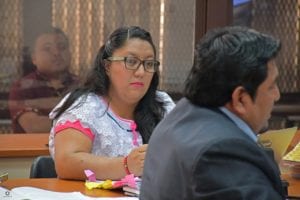Abelino Chub Caal, an indigenous Maya Q’eqchi teacher in Guatemala, was having lunch with his wife and young children when three policemen suddenly arrested him. He was put behind bars without trial, and more than two years passed before he had the chance to testify in court. After a recent three-day trial, Abelino was finally acquitted of all charges and released.
Alarmingly, Abelino’s case is not unusual. Dozens of Indigenous land and environmental defenders have been falsely charged and imprisoned. Sometimes they are jailed for years pending trial. Others have received unfair trials, such as Q’eqchi’ leader Bernardo Caal Xol, who was sentenced to seven years in prison for leading a protest against a hydroelectric dam. Many other indigenous leaders, such as Maria Choc, have been subjected to house arrest.
Expert witness Ramon Cadena of the International Commission of Jurists laid out the details of this larger abuse of the justice system at Abelino’s trial. A study showed that from 2012 to 2017, there were more than 900 instances of criminal charges falsely lodged against defenders of human rights and community land or water. Arrest warrants are being used to silence and threaten people, especially in Indigenous areas, while more prominent leaders like Abelino are singled out for jailing.
Though Abelino’s arrest in February 2017 was abrupt, his name had caught the attention of local authorities years before. Abelino had been working for the Guillermo Toriello Foundation, an organization set up to help implement the 1996 Peace Accords following the Guatemalan Civil War to ensure that the government keeps its promises to protect the human rights, land rights, and self-determination of Indigenous peoples.
For several months Abelino had been serving as a mediator and interpreter between a company called Cobra Investments and Q’eqchi speaking communities whose lands were impacted by the company’s Murcielago banana plantation. In June 2016, Cobra Investments asked him to mediate a second land conflict with the Plan Grande community, where the company had begun planting a new palm oil plantation. They offered Abelino money to share with the community members, along with a car, an apartment in the city, a vacation with his family, and a job with the company – but only if the community would vacate the land claimed by the company. Abelino refused the attempted bribe, and told the company he was certain the community would never give up their land even if he took the company’s money.
On October 17, 2016, a week before using the police to evict Indigenous communities from their land at Murcielago and Plan Grande, the company obtained an arrest warrant for Abelino from a local judge. The company claimed that Abelino had previously organized members of the Plan Grande community to burn oil palm trees which had been planted on community land. The claim was completely false.
Navigating a Corrupt Justice System
To people unaware of the corruption of justice in many parts of Guatemala, Abelino’s case is shocking in many ways. Not only did a local judge grant the company’s request for an arrest warrant without evidence, but she also ordered that Abelino be held without bail. During the years Abelino spent in jail, another judge rejected his appeals for bail, in spite of a different count finding that Cobra Investments’ land title was not legal.
When Abelino’s case finally came to trial on April 22, 2019, before yet another panel of judges, the evidence of his innocence and the company’s strategy to intimidate Indigenous leaders became clear. Abelino testified that he had been in the Plan Grande community only once, for a visit unrelated to the conflict in 2015. Defense eyewitnesses also testified that at the time of the alleged tree burning, Abelino was at home with his family more than 100 miles away, after attending a water rights workshop in the highland province of Solala. Cobra Investments failed to even provide evidence that palm trees had been burned, or that Abelino was involved in organizing any action against the company.
The judges unanimously declared him to be acquitted of all charges. They reprimanded the company, the other judges, and the prosecutor for improperly using the justice system to attack an indigenous leader. They also stated that irregularities in the company’s land claims should be investigated.

Indigenous Lawyers Jovita Tzul (middle) and Juan Castro (right) defending Abelino Chub Caal (far left). [Carlos Cano/GHRC]
Lessons in Land Rights
Abelino’s struggle drew international attention, including from UN Rapporteur for the Rights of Indigenous Peoples, Vicky Tauli-Corpuz. His case can be a watershed moment for Indigenous land rights if Guatemalan society and the international community use the evidence gathered from his case to demand change. Three other expert witnesses closely examined the basis of the community’s land claim as well as that of the company:
- Archaeologist Diego Vasquez discussed the evidence of Mayan settlement and use of land in the Izabal region over a 4,000 year span – from 2000 BC into the 20th century, when the government of Guatemala began to award land to political allies with the pretense and legal stipulation that these were empty lands.
- Geographer Jennifer Casolo testified to the ploys that agribusiness and government officials used to ignore the law, effectively erasing the Maya Q’eqchi’ people’s possession and use of land and denying their existing rights under the law. In particular, the land grabbers did not acknowledge certain Q’eqchi’ ecological practices of letting the forest regrow between periods of cropping. They also ignored the Q’eqchi’ pattern of migration between the highlands and the lowlands, a strategy to avoid violence or enslavement on plantations. In contradiction to the claim that these lands were empty, titles were offered for sale with Indigenous communities advertised as a labor source.
- Historian Harald Waxenecker examined the ownership and power relationships of the Cobra Investments and the irregularities in the documents it was using to claim land, even though the Plan Grande community had been living on and using it for at least 175 years.
Moving Forward
Abelino’s case has repercussions for both the Guatemalan justice system and for Indigenous land rights, especially in the northeast of Guatemala. The case shows that justice is possible because some success remains from the anti-corruption work of the United Nations in Guatemala. However, the justice system still remains deeply corrupted and slow to change. Reform efforts have been impeded by Guatemalan President Jimmy Morales and sabotaged by allies of Latin American oligarchs in the U.S. Congress.
The investigatory role of the UN anti-corruption commission (CICIG) must be restored. Buyers and consumers of agricultural products, such as palm oil and bananas, and minerals extracted from northeastern Guatemala should be aware that companies have taken land from Indigenous communities. They should also know that fraudulently obtained land titles do not supercede the rights of those indigenous peoples under Guatemalan or international law. Governments and international organizations must take steps to both support and push for the restoration of indigenous land rights. They must ensure that companies are not violating human rights. The binding international treaty on business and human rights, currently under discussion, would be an important step.



